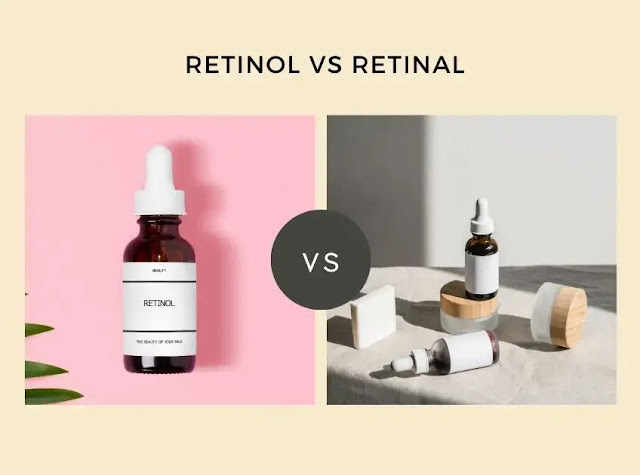Although retinol and retinal might sound similar and perform similar roles, their interaction with the skin sets them apart. Both ingredients are highly beneficial for the skin and assist in addressing signs of aging.
If you're curious about which is better for the skin—retinol or retinal—this article will provide a comprehensive overview. By reading through, you'll gain a clear understanding of their key differences, benefits, side effects, and which might be more suitable for your needs.
Keep reading!
Difference Between Retinol and Retinal
RETINOL
Retinol (1) is the alcohol form of vitamin A, also known as retinal. Given that Vitamin A aids in skin rejuvenation, all its derivatives have similar benefits. Retinol provides numerous advantages for the skin, promoting health, radiance, and a youthful appearance.
Benefits
- Promotes skin cell renewal
- Stimulates collagen production
- Enhances skin brightness
- Improves skin texture and tone
- Contributes to a youthful glow
When retinol is applied to the skin, it is first converted to retinal and then to retinoic acid. This conversion kickstarts the renewal process of the skin cells, leading to visible improvements.
RETINAL
Retinal (2) is the aldehyde form of Vitamin A, scientifically referred to as retinaldehyde. Since it transforms into retinoic acid in just one step, as opposed to the two steps required for retinol, it delivers quicker results. Moreover, it has several advantages over retinol, enhancing its effectiveness.
Benefits
- Boosts collagen production
- Reduces hyperpigmentation
- Enhances skin texture
- Clears clogged pores
- Increases hydration
- Reduces the appearance of large pores
- Provides anti-aging effects
However, there is a downside to retinal as well. Its quick conversion to retinoic acid also means it degrades more rapidly and is challenging to stabilize. These factors make finding an effective retinal product in skincare quite difficult.
The primary differences between retinol and retinal are highlighted below:
- Speed of work: Retinal acts ten times more quickly than retinol, providing visible outcomes sooner.
- Antibacterial property: Among retinoids, only retinal has antibacterial properties, making it ideal for acne-prone skin.
- Skin irritation: All retinoid derivatives can cause skin irritation when used in high concentrations. Retinal causes less irritation compared to others, offering advantages without sacrificing comfort.
- Stability issues: Due to its molecular structure, retinal is difficult to stabilize, which can lead to skincare products with retinal losing their efficacy rapidly.
- Lack of extensive studies: Although users report skin benefits from retinal, there is still a lack of large-scale studies in this area.
The table below outlines the differences between retinol and retinal in various aspects:
| Property | Retinol | Retinal |
| Chemical Structure | Retinol is the alcohol form of vitamin A, featuring an -OH (hydroxyl) group. | Retinal is the aldehyde form of vitamin A, containing a -CHO (aldehyde) group. |
| Function | Retinol serves as the storage form of vitamin A and must be converted into retinal to be utilized by the body. | Retinal is the active form of vitamin A, directly participating in the visual cycle. |
| Conversion | Converted to retinal by retinol dehydrogenases. | Converted to retinol by retinal reductases. |
| Availability | Found in dietary supplements and skincare products. | Less frequently available in supplements; more often used in skincare products due to its rapid conversion to retinoic acid. |
| Role in Vision | Retinal is crucial for vision, combining with opsins to form rhodopsin and other visual pigments in the retina. | Retinol supports vision indirectly by acting as a precursor to retinal for use in the visual cycle. |
| Stability | More stable than retinal and less prone to oxidation. | Less stable because of its aldehyde group, making it more susceptible to oxidation. |
Retinol Vs Retinal- What’s Better for Blemished Skin?
For treating blemishes caused by acne, retinal is very effective. Its antibacterial properties are excellent for combating the bacteria that lead to breakouts, resulting in clearer, blemish-free skin.
Retinol Vs Retinal- What’s Better for Aging Skin?
Since retinal converts to retinoic acid more quickly, it delivers faster results.It enhances collagen synthesis, thereby diminishing the appearance of aging indicators like fine lines and wrinkles. Therefore, individuals with older skin should opt for retinal.
Retinol Vs Retinal- What’s Better for Sensitive Skin?
Sensitive skin is susceptible to irritation. Retinal, being an unstable molecule (3), can degrade faster and trigger irritation. While other skin types might not be significantly affected, sensitive skin can experience discomfort.
Retinol Vs Retinal- What’s Better for Young Skin?
Retinal not only aids in enhancing aging and mature skin but also helps maintain the youthful appearance of young skin. Consistent use of retinal in younger skin can prevent premature aging and lower the risk of fine lines and wrinkles.
Using Retinol Over Retinal
Despite retinal being a more potent form of Vitamin A, promising quicker skin benefits, retinol can be opted for in two situations:
- If retinal causes skin irritation
- If you prefer the oily liquid texture of retinoid
Both retinol and retinal can cause similar side effects, such as dryness and irritation. Therefore, it's recommended to begin with a low concentration. Once your skin adapts, you can gradually increase the strength.
This method helps your skin slowly adjust and build tolerance, minimizing potential side effects.
Conclusion
Vitamin A and its derivatives, retinol and retinal, offer significant skin benefits. However, retinal stands out in terms of potency and efficiency, as it quickly converts to retinoic acid, providing faster results.
Always conduct a patch test before incorporating retinoid products into your routine, and start with a low concentration.
Image Source: Canva
Related Articles
